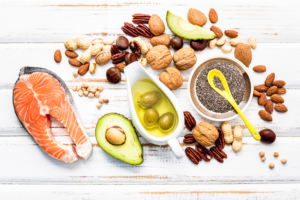Thanks for reading! This week, we’re going to talk about dietary fats, which are actually critical nutrients that provide the human body with energy and support cell function. They contain 9 calories per gram and there are four different types found in foods: saturated fats, transfats, monounsaturated fats, and polyunsaturated fats. The function of these fats is to keep the body warm and protect organs. They also help the body absorb nutrients, produce important hormones, and can become an energy source.
 Now there are “good fats” and “bad fats.” Mono and polyunsaturated fats are recognized as the “good” fats. These fats tend to remain liquid at room temperature and aid in nutrient absorption and healthy hormone production. Saturated and transfats are usually recognized as the “bad” fats. These fats tend to remain solid at room temperature and have the propensity to harden/clog arteries over time as well as raise LDL – your body’s “bad” cholesterol. Healthy fat examples include: avocados, extra virgin olive oil, pumpkin seeds, macadamia nuts, Brazil nuts, and fatty fish. Bad fat examples include: animal fats, butter and lard.
Now there are “good fats” and “bad fats.” Mono and polyunsaturated fats are recognized as the “good” fats. These fats tend to remain liquid at room temperature and aid in nutrient absorption and healthy hormone production. Saturated and transfats are usually recognized as the “bad” fats. These fats tend to remain solid at room temperature and have the propensity to harden/clog arteries over time as well as raise LDL – your body’s “bad” cholesterol. Healthy fat examples include: avocados, extra virgin olive oil, pumpkin seeds, macadamia nuts, Brazil nuts, and fatty fish. Bad fat examples include: animal fats, butter and lard.
So how much fat should you eat each day? Daily fat intake is not a clear cut science. Depending on the style of nutrition an individual follows, this range can vary sharply from low to high daily intake. In general, a rule of thumb to follow is that if daily carbohydrate intakes are ample in your nutrition program, daily fat intake can be kept at a minimum value (30 grams per day) and this will be sufficient to achieve optimal results for general health.
There are, however, dangers of not eating enough healthy fats. If you have a lack of healthy fat intake for an extended period of time, several symptoms can occur. These include:
 Flaky/dry skin and dry rashes. Healthy fats help to maintain the skin barrier, locking in moisture and protecting your skin from irritants.
Flaky/dry skin and dry rashes. Healthy fats help to maintain the skin barrier, locking in moisture and protecting your skin from irritants.- An increased sensitivity to sunburn. Essential fatty acids (omega 3s) aide in reducing cellular stress and inflammation caused by UV rays.
- Mood imbalances and anger issues are common in individuals lacking adequate healthy fats in their diets. Increased anger, irritability and low mood due to changes in serotonin are common. Essential fatty acids (omega 3s and 6s) are well known to support mental health.
- Poor vitamin absorption is typical in diets deficient in daily fat intake. In order to absorb vitamins such as A, D, E and K, daily fat intake must be adequate or deficiencies can occur even if you have a regular intake of such vitamins.
We’re excited to bring you our new blog this March for National Nutrition Month.

